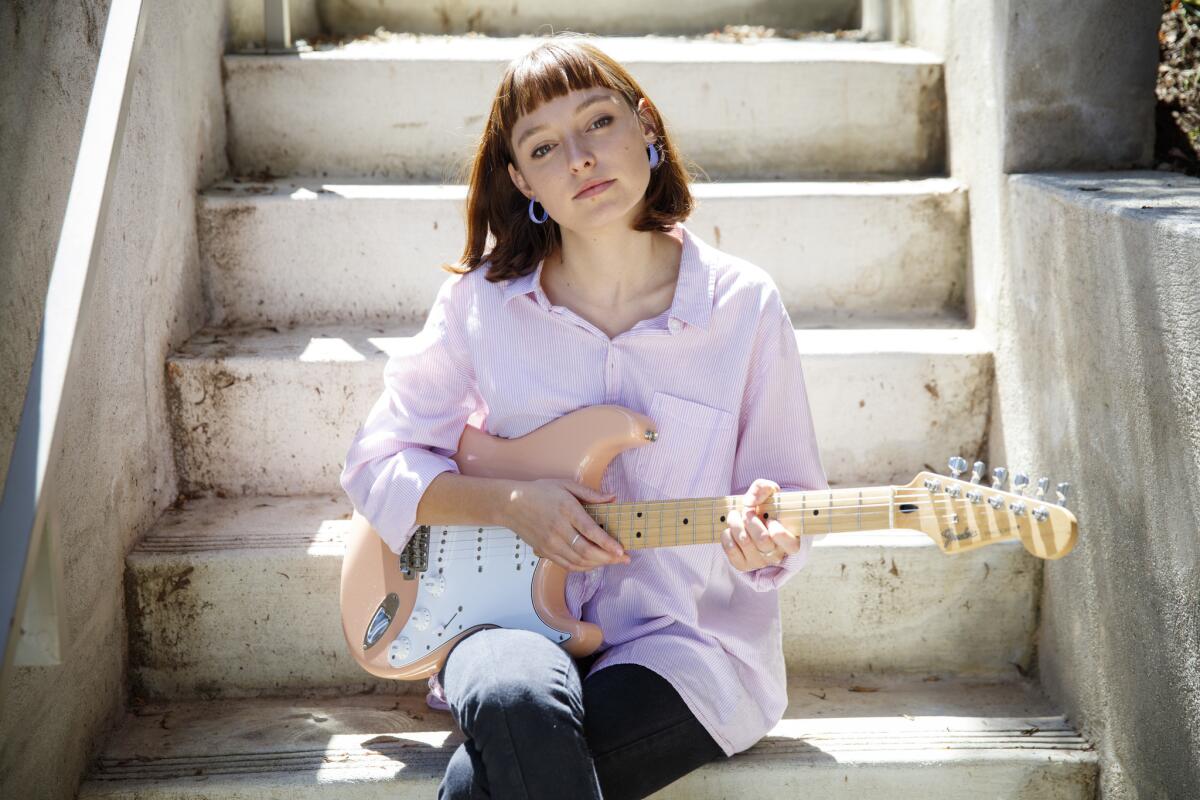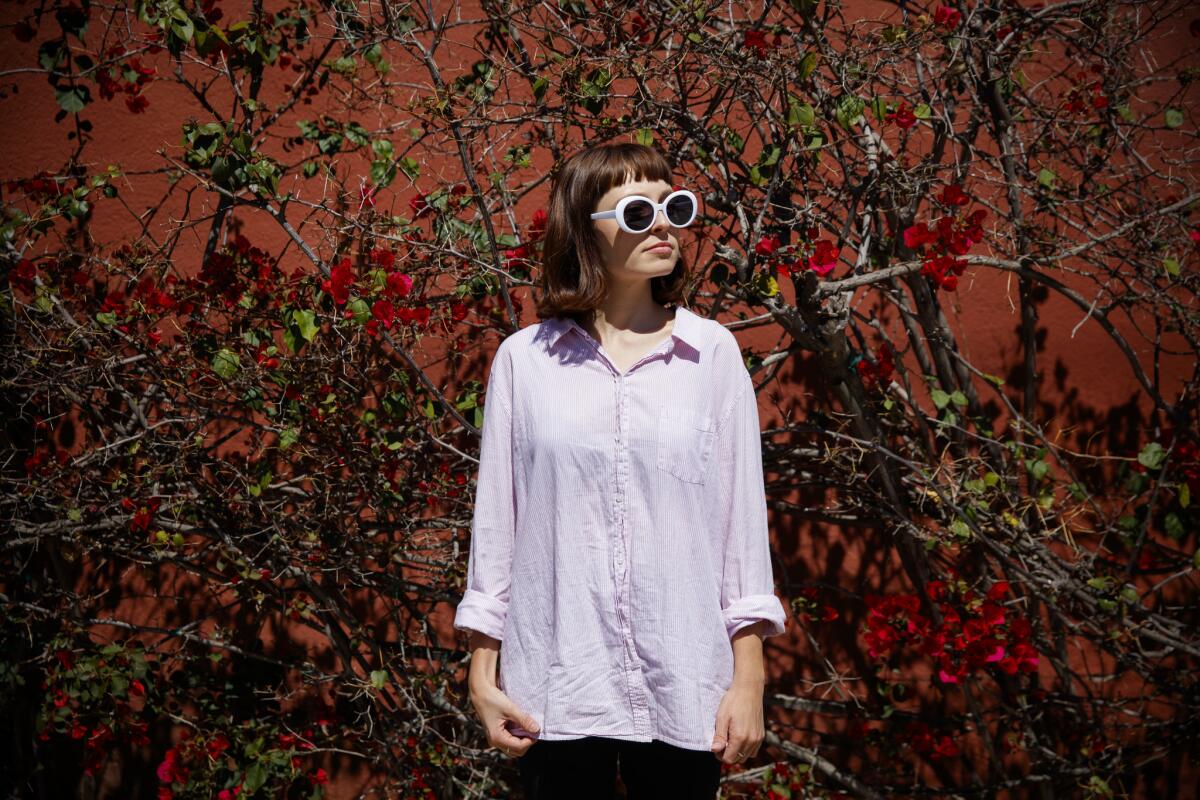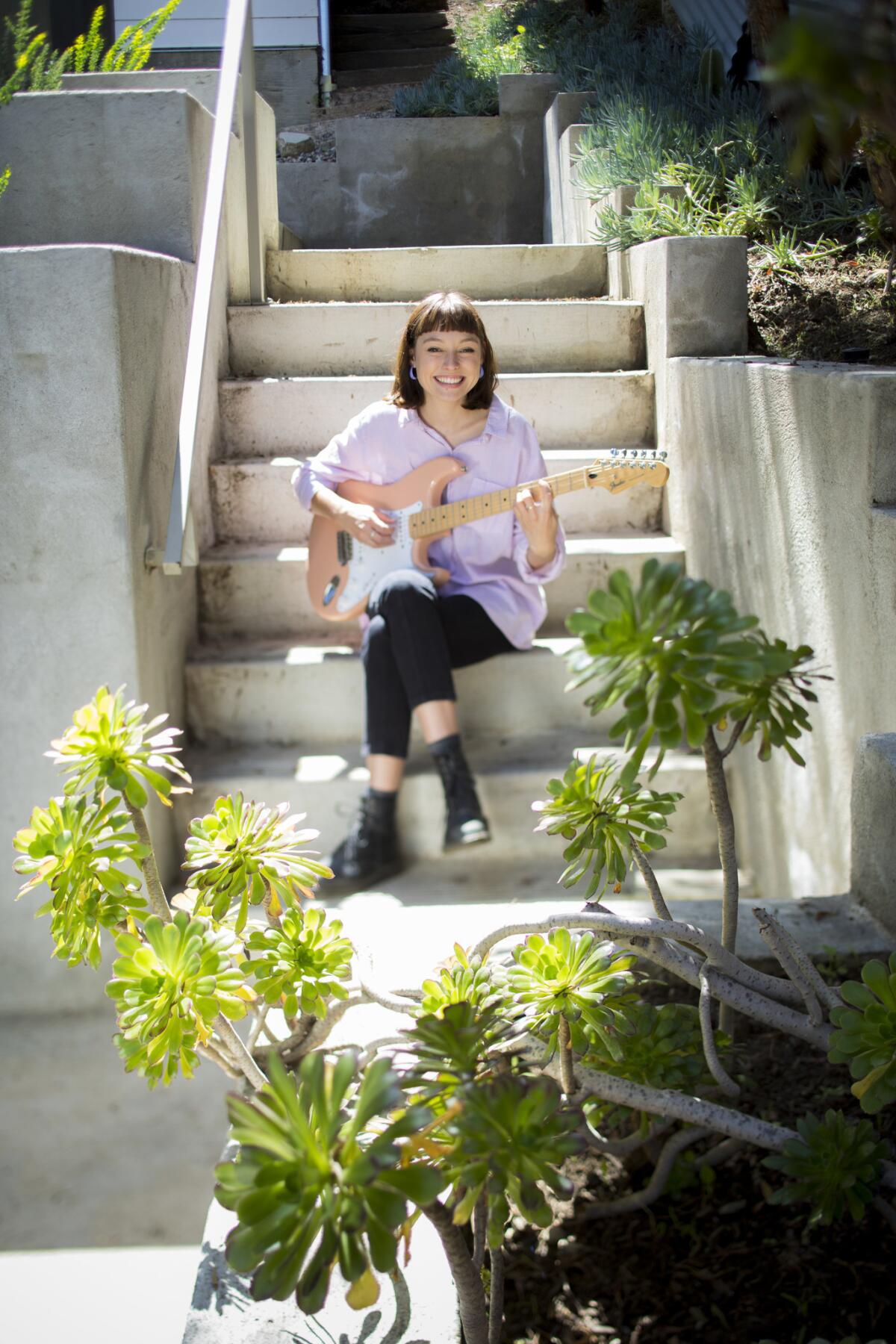Beyond outrage: Australia’s Stella Donnelly mixes the personal and political with humor

- Share via
Tense times call for tense songs, and Stella Donnelly has a few. See “Boys Will Be Boys.”
The single, which introduced the Australian artist to the pop world, goes deep on rape culture with verses that begin by documenting an individual story, in this case one belonging to Donnelly’s friend, and then widen out to encompass victim blaming and the lifelong effects of trauma.
As one may imagine, it’s an intense listen. “Try playing it,” Donnelly says while in Los Angeles recently.
Devastatingly intimate, Donnelly’s song is also unnervingly domestic, as it imagines a conversation between the rapist and his old man. “Your father told you that you’re innocent,” she sings, strumming an acoustic guitar as if this terrifying tale is a lullaby. “Told ya, ‘Women rape themselves.’”
Found on her EP “Thrush Metal,” which was released digitally in the U.S. last August, the song was publicly available before stories of Harvey Weinstein’s sexual misconduct became international news and brought newfound awareness to the phrase “me too.” Donnelly didn’t intend to be a part of a cultural movement — sometimes she just sings about an awkward Tinder date — but she does believe that personal stories told through song can support a wider communal dialogue.

All of us need to wake up.
— Stella Donnelly
“It became very clear that once I had written it, that it was less about me and the situation that had happened very close to me,” she says. “That’s the reason I can keep playing that and not fall into a heap every time. It isn’t for me anymore. It is for others.”
The song’s suddenly topical nature garnered it instant attention.
“That song was never meant to be targeted at just men,” she adds, noting that she’s received quite a bit of hate from strangers online over its content. “It was all, ‘Oh, I guess we hate all men now.’ Back when this incident happened, I had other women speaking to the victim going, ‘Why were you so drunk?’ Everyone, including myself, is a part of that culture, and all of us need to wake up.”
“Boys Will Be Boys” isn’t Donnelly’s only heavy song. The acoustically vicious “Mechanical Bull,” for instance, was inspired by her time spent working in taverns. “As a woman working behind the bar with other women, you just hear the most awful things being said to us and and about us,” she says. Yet Donnelly isn’t out to pummel her audience.
When she details a dead-end relationship on “Mean to Me,” she softens the blow of a significant other criticizing her jokes by leveling another joke. Performing on stage, she’s likely to self-deprecatingly mock one of her own phrases or even add some levity by mimicking a violin with a melodic hum when all that’s present on stage is her and her guitar. And when she tackles racism, she’s apt to do it via a song that chronicles how to tap dance around an offensive relative at the family Christmas party.
COMPLETE COVERAGE: The new sounds of protest
To Donnelly, who is signed to the respected American independent label Secretly Canadian and returns to Southern California with a Sept. 29 show at the Troubadour with the similarly potent Natalie Prass, it’s not just about making audiences laugh. It’s an attempt to elevate the conversation beyond outrage. Her songs, she says, “are trying to work out how to process in a way that isn’t just anger.”
“Online, it’s a very scary place,” she says. “I’m constantly stopping myself from confronting someone over the internet, even if it’s just a person I used to know who’s written a really chronic Facebook status. Do I want to put my thing out in the public world right now, or maybe send him a private message and get him to call me? That might get a little more done than to just attack. A year ago, I would not have held back, but I’m beginning now to go, ‘This has more nuance than we think. And this person has a life as well as me.’”

Born to a schoolteacher father from Australia, and a mother, who is a nurse from Wales, Donnelly’s parents ensured she spent relatively equal time on both continents. While in Wales, her dad would play pubs singing comedy songs — “I haven’t even heard some of the songs he sang, and I think that’s for good reason,” she says — but that’s also where she discovered British folk singer Billy Bragg.
She was drawn to Bragg’s ability to intermix political statements with suburban narratives about regular people. More recently she singles out fellow Australian Courtney Barnett, whose conversational, telling-it-like-it-is pop-rock songs had a not entirely insignificant role in prodding Donnelly’s evolution from singing in wedding cover bands to going it alone.
“I was probably, like, 20 when her first record came out,” Donnelly says of Barnett, “and just the way she wrote, it was like, ‘Oh my God, this is exactly what I’ve been waiting for.’”
Perhaps that’s why one topic Donnelly is forcefully strong about is the issue of diversity, be it on festival lineups, concert bills or playlists. The subject has come under a bigger spotlight in the U.S. of late, due in part to comments Recording Academy President and Chief Executive Neil Portnow made, after this year’s male-dominated Grammy Awards, that women in the music industry needed to “step up.”
“It pisses me off when guys complain about trying to reach quotas or missing opportunities because now they’re being given to women,” Donnelly says. “It’s upping the game. Work harder then. If you’re stuff is good, it’ll be good and people will listen regardless of your gender. But people have been blocking women from getting to that point for so many years. We need to make up for that.”
And to those who disagree, maybe it’s time to simply be quiet and listen rather than post a furious tweet or Facebook status update.
“Everyone’s changing, everyone’s learning,” she says. “I’m still catching up. I’d never begin to claim that I know everything about feminism and that I know everything about intersectionality. I’m just as ignorant as anyone in terms of that stuff.
“But that’s the thing,” she says, “it’s like you’re either trying to educate yourself or you’re arguing against it.”
ALSO
In today’s divisive political climate, pop artists are shaping the new sound of protest music
Kamasi Washington’s ‘Heaven and Earth’ proves jazz’s vitality and political power
To Hurray for the Riff Raff’s Alynda Segarra, the personal is political
‘I can’t stay completely silent’: Jason Isbell looks inward in examining a ‘White Man’s World’
California Sounds: L.A. artists rage and wrestle with politics and policy in the age of Trump
Follow me on Twitter: @toddmartens
More to Read
The biggest entertainment stories
Get our big stories about Hollywood, film, television, music, arts, culture and more right in your inbox as soon as they publish.
You may occasionally receive promotional content from the Los Angeles Times.











